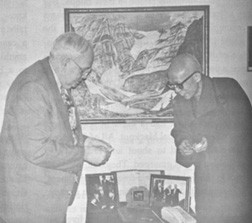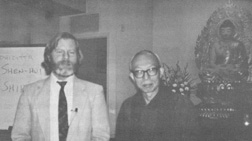 Ch'an
Newsletter - No. 101, Jun 1994
Ch'an
Newsletter - No. 101, Jun 1994
Dreaming and Waking
Lecture given by Master Sheng-yen on June 24, 1979
Edited by Douglas Sipp
Today I would like to speak about dreams. The Buddha described the consciousness of our life awake as essentially similar to what we normally refer to as dreams. This may be difficult to accept, especially for someone who is leading a contented life. No one likes to be awakened from a pleasant dream, let alone be told that that's all their life amounts to.
It is sometimes difficult to distinguish between dreaming and waking. Sleep is made up of short dreams, while life awake is merely a long dream. You may become aware that you're dreaming only to fall back into the dream once again. In Buddhism, to awake from the long dream of life means to realize one's self-nature. A sentient being without this realization remains forever in a dream.
Everything is fleeting, everything unreal. We think of our dreams as unreal and believe our waking moments to be reality. But when we recognize the illusory nature of life and death, the body, and the world, we then see that both sleeping and waking are equally dreamlike.
You may have had the experience of déjà vu -- when you see or read something you think you saw or read before. We all have many experiences and thoughts which trigger feelings and responses in our minds. But those responses are merely fragmentary reflections of the entirety of what we have experienced, thought and imagined.
A famous photographer, Lang Jing-shan, takes pictures of the areas around the Yellow and Yangtze rivers, and makes them resemble Chinese "mountain and water" paintings. The whole image is reduced to an impression. This is how our minds work. Our experiences are stored in fragments in the subconscious mind. We cannot remember them as a whole. But, at a certain time or place the fragments may appear again. This is also what happens in our dreams.
It would be unusual for someone to accept that his life is a dream. Someone who does not see his self-nature thinks he is very much awake and without suffering. When he recognizes the illusory nature of the self, he realizes that he has only been dreaming a very long dream. Relatively few come to this realization. Many have heard about Buddhist practice, but few want to really commit to it. Rarer still is someone who practices and comes to realize his self-nature. This is much the same for someone in a dream. Few people know when they are dreaming. Fewer still want to wake up once they have discovered that they are dreaming.
We realize the impermanence and illusory nature of everyday life in serious daily practice. It is not enough to merely listen to my words, read a book or have an intellectual understanding of the concept.
A well-known Chinese folktale about dreams, known as the "Dream of the Millet," tells the story of a young man traveled to the capital to take the civil examination to qualify as a government official. On the road he met an old man who was cooking millet. The old man saw that the young traveler was tired, gave him a pillow, and told him to rest. The young man lay down and fell into a long dream.
He dreamed that he achieved the highest scores in the examination. Then he married a princess and became the prime minister at the imperial court. He kept many concubines and by the time he reached his hundredth year, his children were too numerous to count. He enjoyed his long life and even in old age he did not want to die. But when the time came for him to die he could not avoid it, and like everyone must, he passed away. After he died, two demons led him down to the underworld because he had abused his bureaucratic power and embezzled court funds. He was punished by the judge of the dead and made to climb a mountain of knives after which he was to be thrown into a vat of boiling oil. He felt a tremendous pain and screamed. Just then the old man woke him up and told him that the millet was done.
It had only taken two hours to prepare the millet, but in the dream the young man had felt a hundred years pass. In the dream, time passed quickly. This is a common experience, not only in dreams, but in daily life. Sometimes we have dreams that seem very long but which really last only a few minutes of waking time. This also happens when we do sitting meditation. If your legs hurt and you can't concentrate, the time seems to crawl, but if your legs feel fine and concentration is not a problem, the time flies.
Dreams are by nature illusory and passing, and our consciousness of time and reality also passes like a dream. But it is a mistake to think that our actions in waking life are as inconsequential as those in dreams. We may not have to suffer the consequences of our actions in dreams, but we cannot avoid those consequences in waking life. Our actions and speech create strong and lasting effects that do not fade away as easily as do dreams. This is the principle of
cause and consequence.
Most people think that they are not responsible for their thoughts if they do not act on them. All of us have bad thoughts we never act on -- wanting to have everything we see, wanting to harm someone we don't like, etc. Sometimes even mothers think about killing their own children when they cry too loudly. For the most part we do not think of these thoughts as breaking the precepts. But for a bodhisattva, to have such thoughts is breaking the precepts. Few people think to strike or kill someone when they are doing sitting meditation. But in their dreams and daily life these kinds of thoughts may arise frequently. One who practices regularly should not have such ideas even in his daily life.
It may be common for people to have non-virtuous thoughts or actions in their dreams. That is because such thoughts reside in their minds. But truly advanced practitioners will not have dreams of wrongdoing, just as they will not break the precepts while awake. This is called correspondence of thought and action. In non-correspondence, a person does not break the precepts while awake, but still has wrongful thoughts when dreaming.
Several years ago I had a class in which there was a sudden electrical blackout. All of the people in the class started to shout and laugh. Why? Their hidden minds emerged. They exhibited self control in the light, but felt free in the darkness. This is similar to non-correspondence in dreams.
Although we may understand that our lives are vain, unreal and dreamlike, we still must be responsible for this dream we live. Just as the activity of the body creates karma, so does the activity of the mind. For example, if you do not know someone is behind you, you might accidentally step on his foot and then apologize. In such a case you would not feel like you had done anything particularly wrong. Likewise, according to a bodhisattva's perspective, the acts of the body are not serious, but those of the mind are. For ordinary sentient beings however, the karma of the body is more serious than that of the mind.
Because the bodhisattva way is based on mental realization, we should understand that karma caused by the body means little compared to karma created by the mind. So, we should pay attention to our mental behavior and take responsibility for it. We must make our minds simple, peaceful and tranquil. This will allow us to reduce our karma day by day. To do so depends upon practice.
|

Dr. David Strangway, president of the University of
British Columbia invited Master Sheng-yen to a luncheon in his honor on
April 21. |
|

Shifu lecturing on "Change Your Mind"
day in Central Park. |
|

Prof. John R. McRae of Cornell University spoke on
"The Formation of Ch'an in China" during a weekend seminar
at the Chan Center |
|
Chan Newsletter Table of Content
|
